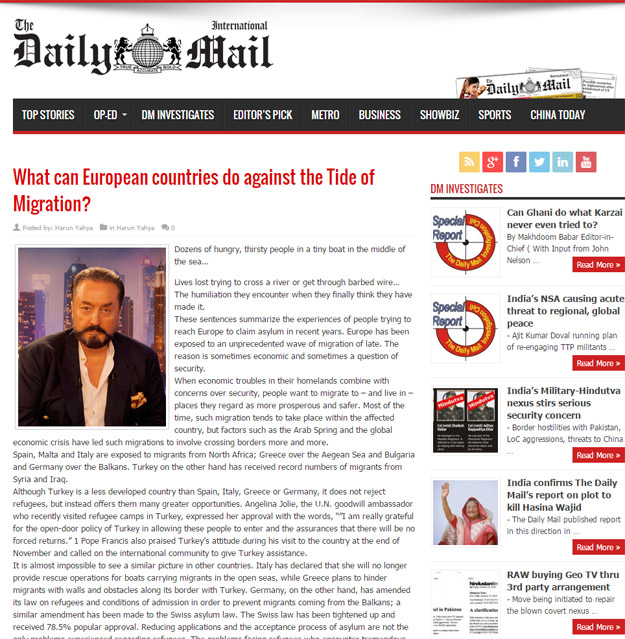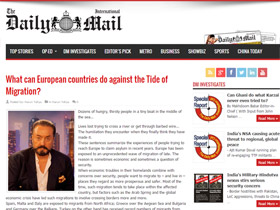
Dozens of hungry, thirsty people in a tiny boat in the middle of the sea…
Lives lost trying to cross a river or get through barbed wire…
The humiliation they encounter when they finally think they have made it.
These sentences summarize the experiences of people trying to reach Europe to claim asylum in recent years. Europe has been exposed to an unprecedented wave of migration of late. The reason is sometimes economic and sometimes a question of security.
When economic troubles in their homelands combine with concerns over security, people want to migrate to – and live in – places they regard as more prosperous and safer. Most of the time, such migration tends to take place within the affected country, but factors such as the Arab Spring and the global economic crisis have led such migrations to involve crossing borders more and more.
Spain, Malta and Italy are exposed to migrants from North Africa; Greece over the Aegean Sea and Bulgaria and Germany over the Balkans. Turkey on the other hand has received record numbers of migrants from Syria and Iraq.
Although Turkey is a less developed country than Spain, Italy, Greece or Germany, it does not reject refugees, but instead offers them many greater opportunities. Angelina Jolie, the U.N. goodwill ambassador who recently visited refugee camps in Turkey, expressed her approval with the words, “”I am really grateful for the open-door policy of Turkey in allowing these people to enter and the assurances that there will be no forced returns.” 1 Pope Francis also praised Turkey’s attitude during his visit to the country at the end of November and called on the international community to give Turkey assistance.
It is almost impossible to see a similar picture in other countries. Italy has declared that she will no longer provide rescue operations for boats carrying migrants in the open seas, while Greece plans to hinder migrants with walls and obstacles along its border with Turkey. Germany, on the other hand, has amended its law on refugees and conditions of admission in order to prevent migrants coming from the Balkans; a similar amendment has been made to the Swiss asylum law. The Swiss law has been tightened up and received 78.5% popular approval. Reducing applications and the acceptance process of asylum are not the only problems experienced regarding refugees. The problems facing refugees who encounter tremendous difficulties in crossing seas and borders do not end once they reach a European country. Many European countries are indeed struggling to cope with a wave of migration that simply exceeds their capacities. However, this does not justify the human rights violations that take place.
Many refugees are subjected to maltreatment, insults and contempt in European countries. In a presentation film prepared by Amnesty International, a refugee approaches the camera and says that Europeans treat animals very well and asks them to treat them as well as they treat their animals because they are dying2. These words summarize the situation very well.
The European Court of Justice sentenced Malta to pay compensation to a Somali national refugee last July. The reason for the decision was that the refugee had been subjected to extreme hot and cold over several months in prison where he was held for deportation, and that he had not been allowed outside. The Court of Justice declared in its verdict “…that the cumulative effect of the conditions complained of diminished the applicant’s human dignity and aroused in her feelings of anguish and inferiority capable of humiliating and debasing her and possibly breaking her physical or moral resistance.”3
Another example of what migrants face in Europe appeared on the EuroNews website under the title “Migrant crisis in Europe getting worse.”4 The report was based on images obtained from a refugee reception center in Germany. The images showed two security officials stamping on the head of a handcuffed Algerian migrant. The migrant shouted at them not to hit him, at which he was dragged onto a filthy bed.
This state of affairs, far beneath the standards of democracy and human rights in Europe, can be eliminated thanks to rulings made by judicial bodies. Both national courts and international courts such as the European Court of Human Rights can issue decrees that help improve this situation of migrants. For that to happen, of course, national courts need to function in a just and unbiased manner.
Another solution is for small countries like Malta to be more adequately supported by other EU countries. The EU must finance accommodation for migrants that befits human dignity and open monitoring stations. Women and children and refugees that are in need of care must be appropriately dispersed among EU countries. In addition, instead of closing borders to refugees, supervised legal crossing routes must be established. In this way, the deaths of hundreds of people as they cross the seas or rivers can be prevented. Furthermore, detention should not be the first thing refugees face. Laws and regulations therefore need to be altered. However, a fundamental solution to the problem is only possible through reinforcing such material measures with an ethical education. The mindset that selfishly considers only its own comfort and interests must be replaced by one based on sharing and self-sacrifice, by a mindset that treats people with love and affection. For that to happen a major responsibility is incumbent upon the state, civil society organizations and the media. Reviving moral concepts such as love and solidarity through a multifaceted campaign will be the most important step toward solving the refugee crisis.
Adnan Oktar's piece on Daily Mail:


